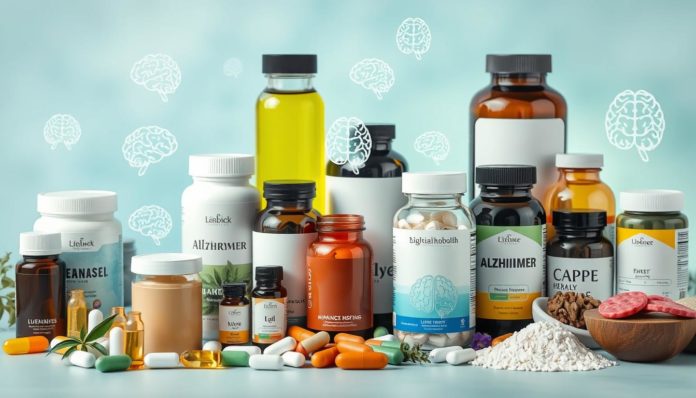Did you know about the estimated 5.8 million Americans living with Alzheimer’s disease? That’s a huge number. It shows how critical it is to find effective treatments and preventive steps. Even though no supplement or vitamin can cure Alzheimer’s, some think that dietary supplements might help the brain.
We will explore various vitamins and supplements talked about in Alzheimer’s care. We’ll look at how they might improve cognitive functions and offer potential protection. But remember, eating a balanced diet is most important. Any supplements should only be taken with a doctor’s advice.
The Role of Nutrition in Alzheimer’s Disease
Effective nutrition is key in fighting Alzheimer’s disease. The link between diet and brain function is important. Eating foods full of vitamins helps your health and may slow Alzheimer’s.

Importance of Balanced Diet
A balanced diet is crucial for Alzheimer’s nutrition. Eating foods with antioxidants and healthy fats helps keep the brain healthy. It’s important to eat less processed foods and sugars, as they can harm your brain.
How Nutrients Affect Brain Health
Some nutrients really help your brain. For example, Omega-3 fatty acids enhance brain function and lower inflammation. B vitamins like B12, B6, and folate are also essential for your brain. Eating a diet rich in these nutrients is better than just supplements for dementia. Such a diet keeps your brain healthy over time and might reduce the risk of losing brain function.
For Alzheimer’s nutrition, it’s important to watch what you eat to make sure you’re getting enough of these nutrients. By focusing on nutrition for the brain and understanding how diet affects brain function, we can improve how we treat and manage Alzheimer’s disease.
Antioxidants for Alzheimer’s Prevention
Antioxidants protect our brains from damage caused by harmful free radicals. These unstable molecules contribute to oxidative stress and dementia. Antioxidants might help lower the risk of developing Alzheimer’s disease.
Understanding Free Radicals
Free radicals are molecules that damage brain cells and tissues. They are a key factor in Alzheimer’s progression. An imbalance leads to oxidative stress, linked to neurodegenerative diseases like dementia.

Key Antioxidants for Brain Health
Certain antioxidants boost brain health. Vitamins C and E, beta-carotene, and resveratrol fight oxidative stress effectively. Eating foods rich in these antioxidants or supplementing can improve brain function and may delay Alzheimer’s onset.
| Antioxidant | Sources | Benefits |
|---|---|---|
| Vitamin C | Citrus fruits, strawberries, bell peppers | Reduces oxidative stress and inflammation |
| Vitamin E | Nuts, seeds, green leafy vegetables | Protects cell membranes from free radical damage |
| Beta-carotene | Carrots, sweet potatoes, spinach | Neutralizes free radicals, supporting overall brain health |
| Resveratrol | Grapes, red wine, berries | Offers neuroprotective effects and improves cognitive function |
The Importance of Vitamin D
Vitamin D is key for our brain’s health. Not having enough can lead to cognitive decline and Alzheimer’s. Studies show we need enough to keep our brains working well.
Sources of Vitamin D
It’s crucial to know where to get Vitamin D. Our body makes it when we are in the sun. But, eating the right foods is just as important. Let’s look at the main sources:
- Fatty fish such as salmon, mackerel, and tuna
- Fortified foods like milk, orange juice, and cereals
- Egg yolks and beef liver
- Supplements
Research on Vitamin D and Alzheimer’s
Research shows a strong link between Vitamin D levels and Alzheimer’s. People with Alzheimer’s often have low levels of it. This suggests Vitamin D is important for brain health. Some studies suggest Vitamin D supplements could lower the risk of Alzheimer’s or slow it down.
By adding natural Vitamin D sources to their meals, people can support their brain. This may help lower their risk of Alzheimer’s.
Exploring Omega-3 Fatty Acids
Omega-3 fatty acids play a key role in keeping our brain healthy, especially when it comes to Alzheimer’s disease. DHA and EPA are the most important types for our brain.
DHA and EPA: The Building Blocks
DHA and EPA are crucial for our brain’s workings. They help keep nerve cell membranes working well, which lets brain cells talk better to each other. Adding fish oil supplements to our meals helps us get these important nutrients.
Study Findings on Omega-3s and Cognitive Decline
Studies show that omega-3 fatty acids might help prevent Alzheimer’s. They suggest that having more DHA and EPA can slow down losing brain functions. Eating them regularly could lower the risk of Alzheimer’s, research says.
| Study | Findings |
|---|---|
| Journal of Clinical Lipidology | Fish oil supplements may improve cognitive function in older adults. |
| National Institutes of Health | DHA and EPA intake is correlated with slower cognitive decline. |
| Alzheimer’s & Dementia Journal | Higher omega-3 levels linked to lower Alzheimer’s risk. |
Omega-3s, especially DHA and EPA, are key for our brain’s health. They could help in slowing down brain function loss, offering hope for fighting Alzheimer’s.
Can Vitamin E Support Cognitive Function?
Many people wonder about Vitamin E and its role in fighting cognitive decline. It is known for its antioxidant qualities. There’s ongoing study how it might help the brain. Yet, its exact benefits on brain function are still widely debated.
Research hints that Vitamin E could protect the brain. This protection comes from Vitamin E’s power to fight off damaging free radicals. However, its effectiveness in Alzheimer’s patients remains uncertain, due to varied trial outcomes.
When thinking about Vitamin E’s value, dosage and personal health are key. The positive effects on Alzheimer’s patients may be minor and slow to show.
Here’s a look at some research results on Vitamin E and Alzheimer’s:
| Study | Year | Outcome |
|---|---|---|
| Memory Assessment Clinic Research | 2000 | Minimal improvement in cognitive functions. |
| Alzheimer’s Disease Cooperative Study | 2007 | Reduction in disease progression for some individuals. |
| Journal of the American Medical Association | 2014 | Significant slowing of functional decline. |
Research continues on how Vitamin E could help the brain. Some studies show its potential benefits. But we need more research and clinical trials to fully understand Vitamin E’s role in preventing and treating Alzheimer’s.
B Vitamins and Memory Support
Getting the right balance of B vitamins is key for a healthy brain. Vitamins like B12, B6, and folate stand out the most. These vitamins boost brain health and are key in supplements for memory, helping to slow cognitive decline and enhance brain function.
Role of B12, B6, and Folate
B12, B6, and folate are vital for cognitive health. B12 keeps the brain and nerve cells working right. B6 is essential for making neurotransmitters, the brain’s signal senders.
Folate is crucial for creating red blood cells and DNA which is vital for brain health. Together, these vitamins lower homocysteine, an amino acid that can increase the risk of brain problems and cognitive issues.
Clinical Studies and Outcomes
Many studies have shown how important B vitamins are for cognitive health. They looked at how B vitamin supplements can help memory and brain function. The findings were especially positive for people low in these nutrients or with high homocysteine levels. They saw improvements in memory and thinking skills.
Memory supplements with B vitamins can add important nutrients to your diet. They help keep your brain healthy and working well.
Potential Benefits of Resveratrol
Resveratrol is found in things like red grapes, wine, peanuts, and dark chocolate. It’s known for its anti-aging properties and may help prevent diseases. It also shows promise in treating Alzheimer’s disease.
Sources of Resveratrol
The main sources of this powerful antioxidant are:
- Red wine compound: The most famous source, making red wine a favorite for many.
- Red grapes: Their skins have a lot of Resveratrol.
- Peanuts: They are a strong but less known source.
- Dark chocolate: A tasty way to get Resveratrol in your diet.
Research Insights
Research has discovered that high doses of Resveratrol might slow Alzheimer’s progression. This makes it a standout natural treatment. But, the Resveratrol in products often doesn’t match what’s used in these studies.
As research continues, the focus on how safe and effective Resveratrol is for Alzheimer’s patients grows. Its potential has caught the attention of both medical and wellness experts.
Examining the Effects of Ginkgo Biloba
Ginkgo Biloba has been a part of traditional remedies for centuries. Now, scientists are studying its effects on cognitive decline. They want to see if it helps people with Alzheimer’s.
Traditional Uses and Modern Research
In Eastern medicine, Ginkgo Biloba was used to improve memory and brain health. Now, it’s becoming popular in the West in cognitive supplements. But, the results from research are mixed.
Some studies show it might slow down cognitive decline. However, other studies say it doesn’t really help memory or stop Alzheimer’s. This shows we need more research to be sure.
Safety Concerns and Side Effects
Even though Ginkgo Biloba might help with Alzheimer’s, there are risks. It can cause headaches, dizziness, and stomach issues. It’s especially tricky for those on blood thinners.
Because it can react badly with some medicines, it’s important to talk with a doctor before using it. This ensures that it’s safe to add to your health plan.
- Traditional Uses:
- Memory enhancement
- Brain health support
- Mixed results on cognitive function supplements
- Ongoing scientific investigations
- Potential side effects: headaches, dizziness, digestive issues
- Medication interactions, particularly with blood thinners
Coenzyme Q10 and Brain Health
Coenzyme Q10, or ubiquinone, is found naturally in the body. It plays a key role in making energy in cells. This energy is crucial for our overall health and for keeping our minds sharp.
The link between Coenzyme Q10 Alzheimer’s and its use as a treatment is still not clear. Studies have tried to see if synthetic Coenzyme Q10 can help. But, no big changes have been seen in treating Alzheimer’s disease so far.
Taking an ubiquinone supplement might help our cells work better by making more energy. Since our brain cells need a lot of energy, Coenzyme Q10 could help keep them healthy. But, we need more studies to prove if it can really affect Alzheimer’s disease.
It’s important to look more into how much Coenzyme Q10 we should take and if it’s safe for a long time. Scientists haven’t agreed on these points yet. This shows we need more research on Coenzyme Q10’s role in brain health.
| Aspect | Details |
|---|---|
| Role | Mitochondrial function, cellular energy production |
| Forms | Natural (ubiquinone), synthetic |
| Studies on Alzheimer’s | Limited, inconclusive results |
| Potential Benefits | General mitochondrial support, cognitive health support |
| Dosage and Safety | Requires further research |
Before trying an ubiquinone supplement for brain health, talk to a health expert. They can guide you about the possible ups and downs. Research on Coenzyme Q10 is ongoing, promising clearer answers soon.
Phosphatidylserine: What You Need to Know
Phosphatidylserine is a vital phospholipid important for cell function, especially in the brain. It is known for aiding cognitive health, improving memory, and possibly preventing Alzheimer’s.
Mechanism of Action
It’s a key part of nerve cell membranes, keeping cells intact. It helps neurotransmitters work better. This boosts memory and brain health.
It used to come from cow brains but is now mostly made from soy or cabbage. This change makes it safer and easier to get.
Clinical Trials and Evidence
Research shows it can help with brain function. Studies with older people show benefits in memory, mood, and thinking skills.
But, we need more studies to be sure it can prevent or treat Alzheimer’s effectively.
Vitamins and Supplements for Alzheimer’s
Alzheimer’s is a tough condition. Keeping the brain healthy with vitamins and supplements is getting a lot of attention. Key nutrients help support the brain and might slow Alzheimer’s down. It’s important to talk to doctors before starting any supplements.
Here are some key best vitamins for Alzheimer’s and important cognitive supplements for Alzheimer’s:
- Vitamin E: It has antioxidant properties and fights free radicals that harm brain cells.
- Vitamin D: Important for health, it might help with brain function.
- Omega-3 Fatty Acids: These fats are essential for brain health and may lessen cognitive decline.
- B Vitamins: B12, B6, and Folate keep the brain healthy and aid memory.
- Resveratrol: In red wine and some foods, it may protect against brain decay.
- Ginkgo Biloba: Used for better brain function, it’s still being researched.
- Coenzyme Q10: This antioxidant helps with energy in cells, key for the brain.
- Phosphatidylserine: Important for cell membranes, it’s studied for brain benefits.
Here’s how some top brain health supplements compare:
| Supplement | Benefits | Sources |
|---|---|---|
| Vitamin E | Antioxidant, Combat Free Radicals | Sunflower Seeds, Almonds, Spinach |
| Vitamin D | Supports Cognitive Function | Sunlight, Fatty Fish, Fortified Milk |
| Omega-3 Fatty Acids | Reduces Cognitive Decline | Fish Oil, Walnuts, Flaxseeds |
| B Vitamins | Memory Support | Meat, Dairy, Leafy Greens |
Knowing and using these top supplements for brain health can help manage Alzheimer’s. Always plan health care with professionals for the best results.
Concerns and Considerations with Supplements
When looking into Alzheimer’s supplements, knowing the issues with purity, safety, and results is key. Most supplements aren’t tested as strictly as drugs. This leaves unanswered questions about their effect on Alzheimer’s. Thus, making safety a big worry for those exploring dementia’s alternative treatments.
Supplements like Axona (caprylic acid) raise doubts about their brain health benefits. They haven’t been widely tested in clinics. Knowing how supplements might react with other drugs is crucial. It’s important to talk clearly with doctors to handle these interactions well.
The regulation of these supplements can change a lot. Dietary supplements don’t always get as much FDA oversight as medicines do. This means you have to do your homework and decide wisely on supplements. For extra information, check out this link here.
FAQ
What are the best vitamins for Alzheimer’s?
Vitamins like D, E, and several B vitamins are often mentioned for Alzheimer’s. Yet, evidence to prove they work is not strong. Always ask a doctor before starting vitamins.
Can nutritional supplements really help with Alzheimer’s?
A healthy diet is key for brain health. Supplements haven’t shown to halt or slow Alzheimer’s. It’s best to get nutrients from food.
How do antioxidants benefit brain health?
Antioxidants fight stress and damage that may lead to Alzheimer’s. This includes beta-carotene and vitamins C and E. But, their effect on Alzheimer’s needs more study.
What role does Vitamin D play in cognitive health?
Vitamin D levels are often low in those with Alzheimer’s. It comes from the sun and fatty fish. Its exact role in Alzheimer’s is still being studied.
Are Omega-3 fatty acids effective in reducing cognitive decline?
Omega-3s, like DHA and EPA, are crucial for the brain. They may improve brain cell function and heart health, important for cognition.
Is Vitamin E useful for Alzheimer’s patients?
Vitamin E might protect the brain. However, its benefits for Alzheimer’s patients are not yet clear. More research is needed.
How do B vitamins support memory?
B vitamins lower homocysteine, linked to brain shrinkage. They’ve shown to help memory in those lacking nutrients or with high homocysteine.
What are the potential benefits of resveratrol for Alzheimer’s?
Resveratrol could help against aging and Alzheimer’s. It’s in red grapes and dark chocolate. But, products often have too little to impact Alzheimer’s.
Is Ginkgo Biloba effective in improving memory?
Ginkgo Biloba’s memory benefits are uncertain. It might also cause side effects and interact with drugs. Always talk to a healthcare expert first.
What is Coenzyme Q10 and how does it relate to brain health?
Coenzyme Q10 supports cell reactions. Its benefits for Alzheimer’s lack strong evidence. The right dose and safety need more research.
What should I know about phosphatidylserine for Alzheimer’s?
Phosphatidylserine showed early promise for brain function. Now made from plants, it’s safer. Its true effect on Alzheimer’s still requires more study.
Are there safety concerns with using supplements for Alzheimer’s?
Supplements for Alzheimer’s raise issues about purity and safety. They’re less tested than drugs. It’s vital to consult healthcare professionals before use.


